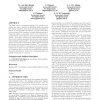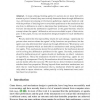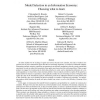212 search results - page 9 / 43 » What should the agent know |
AAMAS
2000
Springer
13 years 8 months ago
2000
Springer
We adopt the decision-theoretic principle of expected utility maximization as a paradigm for designing autonomous rational agents, and present a framework that uses this paradigm t...
ATAL
2011
Springer
12 years 8 months ago
2011
Springer
The main goal of a persuasion dialogue is to persuade, but agents may have a number of additional goals concerning the dialogue duration, how much and what information is shared o...
AAAI
1998
13 years 10 months ago
1998
A key problem in text summarization is finding a salience function which determines what information in the source should be included in the summary. This paper describes the use ...
AMEC
2004
Springer
14 years 2 months ago
2004
Springer
Abstract. In many settings, bidding agents for auctions do not know their preferences a priori. Instead, they must actively determine them through deliberation (e.g., information p...
CI
2002
13 years 8 months ago
2002
As online markets for the exchange of goods and services become more common, the study of markets composed at least in part of autonomous agents has taken on increasing importance...



